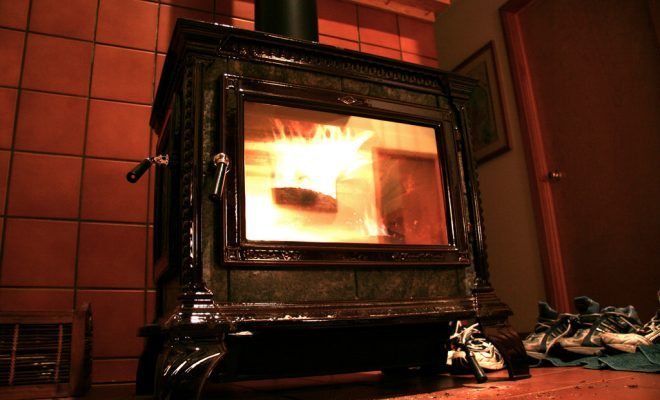 Image courtesy of [Dan Phiffer via Flickr]
Image courtesy of [Dan Phiffer via Flickr]
Energy & Environment
The Heat is On: The Debate Over Woodburning Stoves
Wood is the oldest and most reliable source of heat known to man. Twelve million Americans still use wood stoves to heat their homes. Wood is less expensive than natural gas or electric, and is readily available in rural areas that may not have reliable gas or electric lines. However, there have been some concerns about the environmental inefficiency of wood burning as well as its health effects. Read on to learn about the arguments for and against regulating woodburning stoves.
What are the concerns about wood burning stoves?
The pollution caused by burning wood has been linked to asthma, damaged lungs, and early deaths in areas where woodburning is common. The Environmental Protection Agency (EPA) has announced its desire to institute regulations that would ban all woodburning stoves that release more than 12 micrograms of particular matter per cubic meter, a requirement that 80 percent of stoves currently in use would not meet. This regulation would cause all new wood stoves to burn 80 percent cleaner than stoves manufactured under the existing 1988 regulations. While the EPA regulation promises to cut down on air pollutants and would not affect wood stoves already in use, the proposed ban has been met with opposition by those who believe it will have adverse effects on the wood-stove industry and prohibit many buyers from purchasing. Opponents also dispute the actual impact this ban would have, arguing that the areas with the most air pollution are the areas that contain the least amount of wood stoves in use.
What are the arguments in favor of regulating wood burning stoves?
Supporters of the EPA’s proposal argue that while current wood stove owners will not be affected, future wood stoves will reduce harmful emissions by 80 percent, cutting down on air pollution and saving Americans money on health care. The particles released by burning wood have been linked to lung damage, asthma, shorter life expectancy, and climate change. The EPA estimates that these regulations will provide Americans with $1.8-$2.4 billion in annual health savings, and will reduce carbon dioxide, methane, and black carbon emissions as well.
While eco-friendly wood stoves are more costly to make and purchase, the EPA and its supporters argue that individuals will see returns in the long run in reduced healthcare costs and improved overall health. Some states have already needed to decree woodburning bans for short periods of time. In December 2013, Utah banned wood burning in five counties when weather conditions and increased wood burning led to dangerous levels of particular matter in the air around these areas. Similar actions have been taken in parts of Alaska. Advocates of the EPA’s ban see these events as signals that stronger federal action needs to be taken to ensure wood-stove pollution does not produce lasting damage. Supporters also emphasize that the proposed regulations would only come into effect in 2015, and that they would not affect wood stoves already in use.
What are the arguments against regulating woodburning stoves?
Opponents argue that these regulations will destroy the wood-stove industry, costing many Americans jobs and financial stability. The regulations will make the production of wood stoves more expensive, and with the majority of wood-stove buyers being rural, low-income families, this ban on cheaper, less-environmentally friendly stoves could cause a reduction in stove sales and cause many wood-stove manufacturers to go out of business.
Although the ban will only affect newly manufactured stoves, citizens will be prevented from selling their old, inefficient stoves, making them incapable of trading their old stoves for a new one. Many opponents also see these regulations as an example of what they call the EPA’s “Sue and Settle” policy. Opponents accuse the EPA of working in tandem with large environmental groups and state agencies in a process whereby the group will sue the EPA for not going far enough in its restrictions and regulations, and instead of going to court the EPA will settle out of court by offering to impose what some believe are pre-determined regulations on manufacturing, allowing both the EPA and environmental groups to get what they want through the façade of a lawsuit. Shortly after the wood-stove ban was proposed, Connecticut, Maryland, New York, Massachusetts, Vermont, Oregon, and Rhode Island filed a lawsuit against the EPA claiming it did not do enough to reduce air pollution and demanded that the EPA add woodburning water heaters to the list of regulated woodburning appliances. Opponents of the regulations have cried foul and accuse the EPA of using a corrupt scheme to impose regulations that will force wood stove manufacturers out of business and will make it more difficult for rural families to heat their homes.
Conclusion
Woodburning stoves are a simple way that people can provide energy — particularly heat — for their homes. But they’re not always the most efficient or environmentally friendly way to do so. The potential health concerns have also led to worries. As a result, the EPA has taken action to try to change the ways in which woodburning stoves are regulated. There are many proponents of the stoves, as well as those who want to see them done away with, but change and regulation will be slow to develop.
Resources
Primary
Environmental Protection Agency: Source Performance Standards for Residential Wood Heaters
Additional
Climate Progress: No, President Obama is Not Trying to Make Your Wood-Burning Stove Illegal
Fox News: EPA Proposes Restrictions for New Wood Stoves
Washington Post: EPA Moves to Regulate New Wood Stoves
NewsMiner.com: Feds Announce Plans for Stricter Wood Stove Regulations
Clovis News Journal: People Justified to Get Heated on Stove Rules
Forbes: EPA’s Wood-Burning Stove Ban Has Chilling Consequences For Many Rural People
New American: EPA Wants to Snuff Out Wood and Pellet Stoves
Inquisitr: EPA Wood Stove Bans Include 80 Percent of Burners Now on the Market
Independent Sentinel: EPA Bans Most Wood Burning Stoves in a Corrupt Scheme, Fireplaces Next
Troy Record: EPA Wood Stove Ban is Heating Debate
Newsmax: EPA Wood-Stove Proposal Prompts Rural Backlash
National Conference of State Legislatures: Regulating Fireplaces and Wood-Burning Stoves
Gazettenet.com: U.S. EPA Issues Tougher Regulations For Residential Wood-Burning Devices








Comments